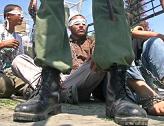
Palestinian prisoners held captive in Israeli Jails, have been on hunger strike as of August 15th, 2004. An estimated 7500 Palestinians are said to be held illegally by Israeli Prison Authorities. These prisoners have been, cumulatively captured since the beginning of the Palestinian civil uprising which began on September 28th, 2000. The hunger strike is entering its 18th day, with no predicted end in site.
The Palestinian hunger strikers are following this form of non-violent protest, which was set as a precedent by Kurdish inmates in Turkish prisons, as well as, Irish prisoners in British Jails. Israeli prisons are notoriously known for their savage treatment of Palestinian prisoners; (much like the scandals that broke out concerning Abu Ghraib in Iraq) being the only country in the world which legally permits the use of torture as a form of interrogation. That is just to mention one of the downsides of being held in an Israeli prison.
This hunger strike finds its roots, firstly because of the ridiculous claim that 7500 Palestinians are deemed by Israel as terrorists and thus a threat to Israel’s vulnerability. Secondly, for the inhumane treatment that Palestinians have had to endure for so long. The list of violations is quite nifty:
1) Arbitrary and indiscriminate beating of prisoners in their cells, in prison courtyards and during transportation to and from prisons.
2) Arbitrary and indiscriminate firing of tear gas into prisoner’s cells and prison courtyards and intimidation of prisoners by guards entering their cells with guns.
3) Humiliating strip searches of prisoners in full view of other prisoners and guards each time they enter or exit their cells.
4) Subjecting prisoners to solitary confinement for excessive periods of time, for months and even years.
5) Arbitrary imposition of financial penalties on prisoners for minor infractions, arbitrary revocation of visitation rights and extended confinement to cells as punishment for minor infractions such as singing or speaking too loudly.
6) Confining children with adult prisoners and political prisoners with criminals.
7) Withholding or delaying medical treatment and the provision of medication to sick detainees.
8) Severely restricting the category of family members entitled to visit prisoners thus denying visitation rights to other close family members.
9) Arbitrary denial of travel permits to family members of prisoners living in the West Bank or Gaza so that they cannot travel to prisons to see their relatives.
10) Imposing conditions on travel for family members and obstacles that result in travel of a few hours being prolonged to 16 or 17 hours for a 45-minute visit.
11) Conducting humiliating strip searches of visiting family members even though they are usually separated from the prisoners by a full glass barrier as well as a wire mesh barrier.
12) Providing such poor visitation facilities that prisoners find it difficult to see or hear their loved ones.
13) Maintaining prisoners on near starvation diets that are insufficient to sustain health.
14) Applying rules concerning items that prisoners may receive from their families arbitrarily and inconsistently, on the whim of the guards, with each visit.
15) Withdrawing studying privileges that in the past allowed prisoners to continue their high school or university education through correspondence courses.
Throughout its 18 days, the hunger strike staged by the prisoners has gained in momentum and exposition, though nothing to compare with the scandalous status that Abu Ghraib had reached, snatching headlines around the globe. It is becoming evermore apparent to the world, what these prisoners have to cope with.
With concerns to Israel, there seems to be no common ground to initiate negotiate or strike a deal in order to free the abductees. Statement such as, “as far as we are concerned they can starve to death,” given by Israel’s Public Security Minister Tzachi Hanegbi, or "I reject outright all the terrorists' requests," can only be interpreted as an attempt to show utter defiance. As if this was not enough, Israel’s defiance with respect to the prisoners does not end here. In an attempt to psychologically demoralize and dispirit the Palestinian captives, Israeli Prison Authorities staged a Barbeque adjacent to the prisoners’ cells, to test their steadfastness.
In the initial stages of the hunger strike Palestinian captives made an explicit point that they were refraining from food given to them by prison authorities, however, not salt and water, which are so vital when undertaking such a strenuous endeavor. In several petitions issued by the Arab-Israeli Human Rights Organization Adalah, the organization took upon itself the mission to clarify this issue, to the government of Israel, that the confiscation and refusal of providing prisoners with sufficient water and salt supplies is in contravention to International and Israeli domestic Law. Then again, when has Israel ever abided by any law?
However the saga does not end here, following reports that, on Sunday the 29th of August, the prisoner’s detained at Asqalan had temporarily suspended their hunger strike, in an apparent deal struck with Israeli Prison Authorities, turned out to be a failed attempt by the Prison Authorities to ‘Out Smart’ and fool the Palestinian Prisoners. The inmates at Asqalan resumed their hunger strike the following day.
What a cheap price to pay for freedom! At least for Palestinians that is. August 30th, marked the first Martyr fasting in solidarity with the prisoners. 55 year-old Aisha el-Zaben mother of the Palestinian detainee Ammar al-Zaben, (detained for some 20 odd years) died of a heart attack sustained, following the stresses endured related to her fasting.
With no end in site, it remains a riddle, what the fate of the Palestinian prisoner issue will be.



